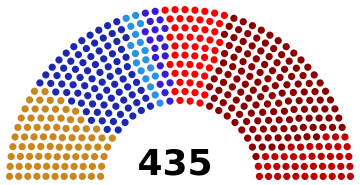Two-hundred and nineteen of the current members of the U.S. House of Representatives are members of the Democratic Party. Two-hundred and eleven are members of the Republican Party. In many countries, this would imply that roughly half of MCs are aligned with one party and roughly half are aligned with the other party. Like so:

This is the way we almost always think about, discuss, and demonize the House. Ideologically split down the middle, with half its members in one camp and the other half opposed, always. But what if we thought about it more like this:

This is the reality of the House and it looks an awful lot like a multiparty democracy, the kind you might see in Europe, Asia, South America, or Africa. You know. Not America.
Senator Joe Manchin has made headlines this week by vowing to vote against the For The People Act, a voting reform he co-sponsored in Congress in 2019. Manchin says his opposition comes not from the bill itself, which he supports, but from a belief that election reform should be a bipartisan effort. Said Manchin in an op-ed for the Charleston Gazette-Mail, “congressional action on federal voting rights legislation must be the result of both Democrats and Republicans coming together to find a pathway forward or we risk further dividing and destroying the republic we swore to protect and defend as elected officials.”
Republicans have made it clear what kind of election reform they’d support. Since losing the 2020 presidential election, they’ve introduced more than 250 bills to restrict voting access. Republican efforts focus primarily on voter fraud, a thing that exists only in very small doses and does not impact the outcome of elections, rationalizing that disenfranchising millions is worth preventing even a single fraudulent ballot, as long as those millions are Democrats.
By looking at Congress as a body of two parties, Manchin proclaims that only one party has weighed in on this measure. This isn’t true, though. Even from a technically correct – the best kind of correct – standpoint, two independents – Senators Angus King of Maine and Bernie Sanders of Vermont – have backed the For The People Act. You can get more technically correct and say that King and Sanders are members of the Senate Democratic Caucus, sure – but Sanders is also a member of the Senate Progressive Caucus and runs on the Vermont Progressive Party ticket.
There’s just one Progressive in the Senate, but in the House there are ninety-three. The Progressives came together with the New Democrats and Blue Dogs to back election reforms. These are fundamentally different parties – and would be in most other countries – aligning together to pass cross-party legislation. Manchin, a Blue Dog if I’ve ever seen one (Manchin is a member of the Congressional Sportsmen’s Caucus, no really, but doesn’t appear to be in any ideological caucuses), has decided that the participation of these other groups isn’t enough because they’re all called ‘Democrats.’
Across the aisle, we’re watching Republicans struggle to keep cohesive. The GOP has censured lawmakers and officials who refused to enable a coup against the United States in January. The goal is to drive out anyone who doesn’t pledge total fealty and loyalty to Donald Trump over the Constitution, the rule of law, and honest decency. The result could be the creation of a new center-right party, as a number of Republican figures have suggested.
It’s not actually a bad thing if the Republican Party fractures, and the Democratic Party should think about it, too. At the very least, it should stop allowing people like Manchin to claim that getting Democratic lawmakers to agree on something – anything – isn’t a herculean effort of bipartisanship in and of itself.

You must be logged in to post a comment.